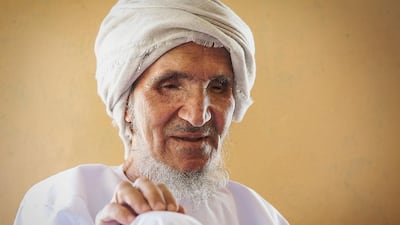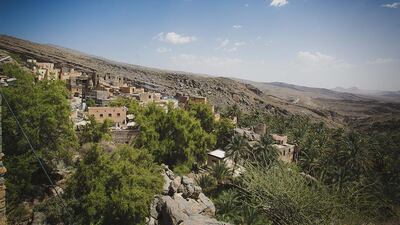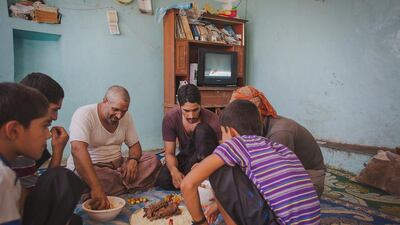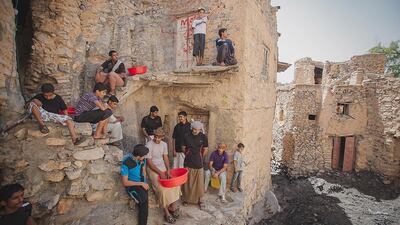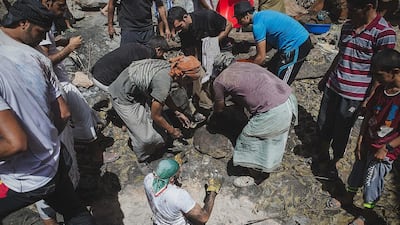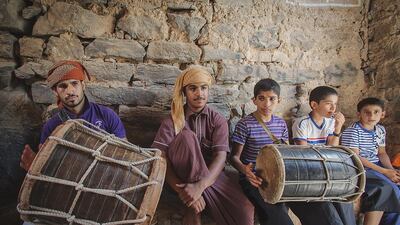In the mountain village of Misfat Al Abriyeen in Oman, Eid Al Adha feasts last three days and each is better than the last.
The first day of Eid Al Adha brings garlic stewed meat. The second day is mashkik, boneless grilled meat, served with thin bread. The third is shuwah, marinaded meat wrapped in banana leaves and baked underground for days.
Oman is famous for its shuwah, which is baked in communal pits large enough to serve an entire village, and is a particular favourite at the feast of sacrifice.
Misfat Al Abriyeen is a village blessed with an abundance of food and fresh water. Its old stone and mud homes are shaded by date palms. Dense banana trees hide twisting stone staircases.
But in the past, food could be scarce. At those times, the Eid shuwah was an opportunity for thievery.
The communal goat pit used to be outside the village, where a car park is now situated. Thieves would sneak into the pit at night and steal the meat, unable to bare a two or three-day wait until the feast day.
“There was a lot of hunger,” says Sulaiman Nasser, 71, a village elder. “People could not be angry about this because it was all due to hunger. There were always dates before but no rice, and very little bread.”
This story dates from about 150 years ago. It is said that shuwah theft was so common that a decision was made to put the pit in a courtyard deep inside the village, surrounded by “respected” residents on all sides who could keep an eye on the meat as it cooked.
The only way into the courtyard was through a narrow tunnel off a winding alleyway. Families from Misfat Al Abriyeen have since moved to new villages or big cities, but continue to return to this secluded courtyard every Eid.
Mr Nasser recounts this tale from his majlis, a bright yellow sitting room with long windows that catch the mountain breeze. For more than 30 years he was the keeper of the town’s shuwah pit, overseeing its fire during feasts.
For the rest of the year, he worked as the mosque caretaker. As such, it fell to him to care for the mosque’s 100 palm trees, its lemon and mango trees, and to manage the village’s irrigation system.
Any revenue from the farms was reinvested into the mosque. Mr Nasser is now blind because of diabetes and although some villagers still call him the “deputy of the fire”, he trusts his son Zaher to help to oversee the pit these days.
The fire is lit on the first day of Eid and about 40 large parcels of meat, one from each family, are placed into the ground when the flames die down that afternoon.
It is cooked for two days and eaten at lunch on the third and final day of Eid. Smoke rising from the village centre is a sign that Eid is well and truly under way.
In Mr Nasser’s household, preparations for Saturday’s feast began two years ago when his family bought a young bull for 350 Omani rials at the Nizwa market, known to have the region’s best livestock.
His daughter-in-law Zahara Sulaiman began her Eid preparations weeks in advance. Women in Misfat Al Abriyeen ferment the shuwah marinade for up to four weeks, creating a potent vinegar of pressed garlic, dates, salt, and black and red chillies.
Ginger, turmeric and cinnamon are added one day before Eid Al Adha. Men say every recipe is identical, but the women beg to differ.
“They’re all the same, yes, exactly the same,” says Mrs Sulaiman’s daughter, Sahar Zaher, who is in her early twenties. “But really, my mother and grandmother’s is best. It’s not just me who says that. Everyone says so.”
This spice blend is known as ‘shuwah spice’ and is only made during Eid.
“When I smell this, I know Eid is here,” says Mrs Sulaiman. “What’s important is that the spices are fresh. Garlic is the most important thing of all. I don’t mean a little bit of garlic. A lot – a carton. A full carton of garlic.”
If that sounds a bit much, every part of the bull is eaten. The bull meat prepared during Eid will last the family for almost a full year.
When a bull is slaughtered, every person in the family is needed to help. Mr Nasser’s traditional three-storey house is built around an open-air stone staircase. His family are at work on every floor.
On the first landing, a grandson chops bones with an axe. On the second landing, two sons prepare the bull’s head for the shuwah, slathering it with Mrs Sulaiman’s marinade. An orange is stuck in its mouth so teeth will not rattle in the fire pit.
On the third landing, men and brightly-dressed women sort the meat: intestines on a platter, lungs in one bucket, kidneys and liver in another. Boneless meat is hung on a rope strung across the ceiling, to dry.
The house is filled with the smells of spices and garlic.
Any type of meat or body part can be cooked in the shuwah pit but it is particularly suited for the head and the neck, which are not always easily cooked in a palatable way. Shuwah solves this problem.
The spiced head is wrapped in shredded banana leaves and placed in soaked burlap, bound with rope or thin metal wire. After two days of roasting, shuwah meat is tender and delicately spiced. Half of the meat is immediately eaten and the other half is frozen.
But shuwah is about more than the meat. It reunites Mr Nasser’s family and his village.
Residents began moving to a mountain across the valley in the 1990s. Mr Nasser’s family is one of five original families who have stayed.
“I will never leave,” he says. “Never.”
For his children, it is only a matter of time and money. One son has already left with his family. Mr Nasser’s son Zaher and daughter-in-law Zahara have a house under construction.
But during Eid, everyone returns to visit old neighbours and to put their meat in the shuwah pit.
Boys arrive at the village early on the morning of the third day of the feast, hours before the shuwah pit opens, beating their grandfathers’ drums. They crowd the tunnel and alleyways outside the courtyard, beating a rhythm used only for Eid feasts.
In Misfat Al Abriyeen, the final day of Eid is not so much about the feast, as its anticipation. The boys drum for hours and the crowd in the alleyway grows.
“Without drums, there’s no welcome and no Eid,” says Hameyar Sulaiman, 17, a student from the village who studies in Hamra.
Inside the courtyard, the blazing fire lit on the first day of the feast has been reduced to a great mound of black ash. Underneath the ash the shuwah continues to cook.
Shuwah collection is the job of young men who have the strength to lift heavy parcels. After hours of alleyway lingering, they enter the courtyard at noon, filling the corners and stone staircases and the tunnel outside.
A cheer rises from the courtyard when three shovels arrive but the excavation cannot begin until midday prayers have officially ended.
Zaher arrives with two friends, the prayers end and the digging begins. Men and boys take turns digging, climbing onto the pile of ash in their sandals. Soot and ash fill the air.
After 10 minutes, they reach a shoulder-deep pit covered by palm trunks. It is filled with parcels of shuwah. Two men jump into the pit and each time they hand out a parcel, the crowd gives a whoop and a cheer.
There is no confusion over which packet belongs to whom. Tightly bound on top of each sack is a piece of metal to identify its rightful owner – a bit of rebar, a faucet, a door knocker, a crushed lantern, a pipe, a flattened Fanta can.
Inside, the shuwah is steaming hot. After a long morning waiting in the town alleyways, the courtyard and shuwah pit are empty within half-an-hour and will remain so until next year.
For Mr Nasser and his children, the meal is simple and quick, good, but not as sweet as the days they spend together in its preparation.
“I feel so happy when everyone comes back,” says Mrs Sulaiman. “We don’t see people every day anymore. But even if they leave, they don’t go far. Their farms are here and the shuwah is here.”
newsdesk@thenational.ae
